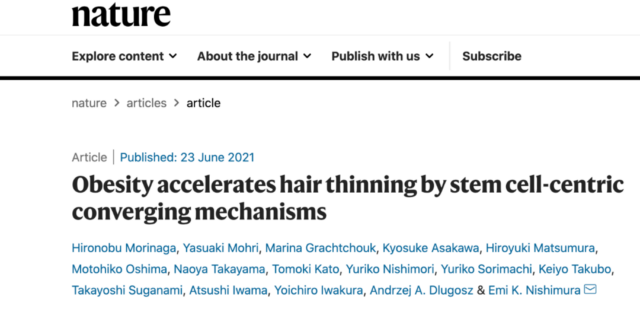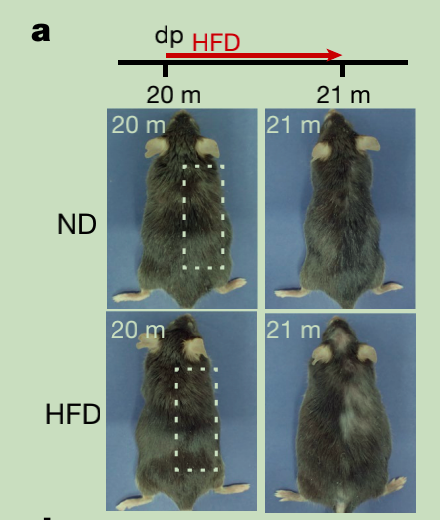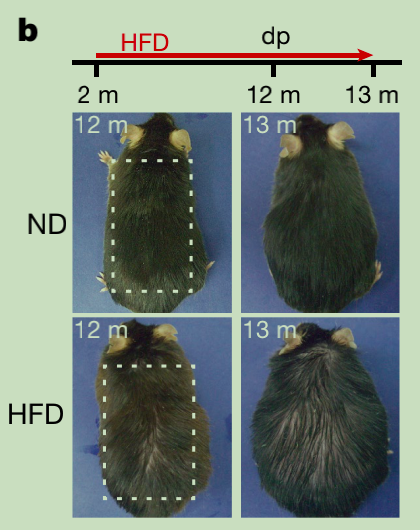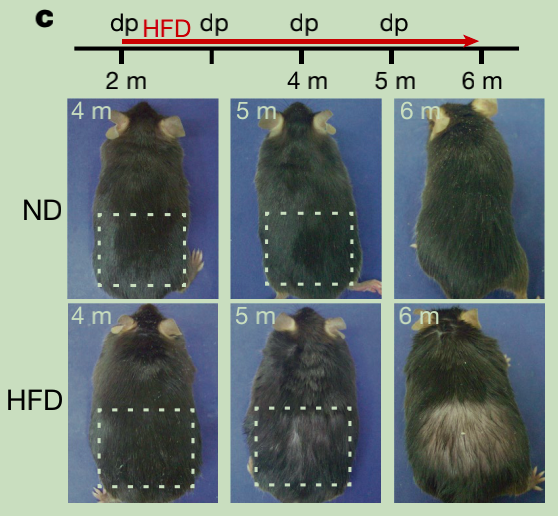Nature: Obesity causes irreversible hair loss and may make you bald
- Aspirin: Study Finds Greater Benefits for These Colorectal Cancer Patients
- Cancer Can Occur Without Genetic Mutations?
- Statins Lower Blood Lipids: How Long is a Course?
- Warning: Smartwatch Blood Sugar Measurement Deemed Dangerous
- Mifepristone: A Safe and Effective Abortion Option Amidst Controversy
- Asbestos Detected in Buildings Damaged in Ukraine: Analyzed by Japanese Company
Nature: Obesity causes irreversible hair loss and may make you bald
- Red Yeast Rice Scare Grips Japan: Over 114 Hospitalized and 5 Deaths
- Long COVID Brain Fog: Blood-Brain Barrier Damage and Persistent Inflammation
- FDA has mandated a top-level black box warning for all marketed CAR-T therapies
- Can people with high blood pressure eat peanuts?
- What is the difference between dopamine and dobutamine?
- How long can the patient live after heart stent surgery?
Nature: Obesity causes irreversible hair loss and may make you bald
As we all know, obesity is not only a high risk factor for diseases such as diabetes and hypertension, but also a risk factor for androgenic alopecia. However, although overweight people have a higher risk of androgenic alopecia, whether obesity will cause hair loss and the underlying molecular mechanisms are still unknown.
As we all know, obesity is not only a high risk factor for diseases such as diabetes and hypertension, but also a risk factor for androgenic alopecia.
However, although overweight people have a higher risk of androgenic alopecia, whether obesity will cause hair loss and the underlying molecular mechanisms are still unknown.
Recently, a study published in nature found that obesity changes the differentiation fate of hair follicle stem cells by activating certain inflammatory cytokine signals, making them differentiate into keratinocytes or sebum-secreting sebocytes on the skin surface instead of hair growth. Necessary hair follicles, leading to hair follicle shedding and hair loss.

DOI: 10.1038/s41586-021-03624-x
The hair follicle is a tunnel-like structure in the epidermis (outer layer) of the skin, and hair starts to grow at the bottom of the hair follicle. Hair follicle stem cells are long-lived cells in hair follicles.

Our hair follicles go through the cycle of growth, regression and telogen throughout their lives. This process relies on hair follicle stem cells to drive, that is to say, the periodic self-renewal and growth of hair actually depends on the periodic proliferation and differentiation of hair follicle stem cells (HFSCs).
Under normal circumstances, HFSCs will self-renew in each follicle cycle. This is part of the process of continual re-growth of our hair. As humans age, HFSCs cannot replenish themselves, resulting in a decrease in HFSCs and therefore hair thinning.
In this study, researchers at Tokyo Medical University (TMDU) used mouse model experiments to study how a high-fat diet or genetically induced obesity affects hair thinning and shedding.
Researchers fed 20-month-old mice with HFD or normal diet (ND) for one month. It was found that elderly mice fed with HFD had diffuse thinning of hair.

Next, in order to study the effect of obesity on hair follicles, wild-type male mice were fed HFD or ND when they were 2 to 12 months old. HFD-fed mice also showed a reduction in the number of hairs and a fluffy appearance. Moreover, hair loss becomes more serious after the hair cycle is induced by hair removal.

In addition, after several rounds of hair cycle induction in HFD-fed mice (but not in ND-fed mice), more severe and irreversible alopecia can be induced.

The researchers then analyzed genetically obese mice, chemically diabetic mice, wild-type mice fed a high sucrose diet, HFD-fed female mice, and HFD-fed male mice.
The study found that genetically obese mice and HFD-fed mice also showed severe hair loss at 6 months of age. Female mice fed by HFD showed hair loss at 8 months.
However, streptozotocin (STZ) treated diabetic mice or mice fed a high sucrose diet did not show signs of alopecia.
These results indicate that metabolic stress caused by obesity can accelerate hair loss.
Next, the researchers compared the gene expression of HFSCs between HFD-fed mice and standard diet-fed mice, and tracked the fate of these HFSCs after activation.
It was found that those HFSCs in HFD-fed obese mice changed their differentiation fate and differentiated into keratinocytes on the skin surface or sebocyte secreting sebum. Since the number of HFSCs is certain, when HFSCs differentiate into other cells, there is not enough number to differentiate into hair follicles, which makes the mice lose hair and have smaller hair follicles.
Research results show that obesity can cause hair follicle stem cells (HFSCs) to deplete by inducing certain inflammatory signals, prevent hair follicle regeneration, and ultimately lead to hair follicle shedding.
In order to determine which signaling pathway determines the change in the fate of HFSC differentiation, the researchers conducted microarray analysis and RNA-sequencing (RNA-seq) analysis. Microarray data showed that the expression of SHH signaling pathway was significantly reduced in the growth phase HFSCs of HFD-fed mice.
In order to study whether HFD’s inhibition of SHH signal will lead to the alteration and depletion of HFSCs. The researchers analyzed TetO-Gli2ΔC transgenic mice, the SHH pathway of this transgenic mice was specifically and temporarily inhibited.
When the SHH signal is inhibited for one week and the hair cycle is induced at the same time, one month later, the HFSCs are depleted, and the hair follicles become smaller or disappear and hair loss occurs.

This indicates that SHH signal is essential to maintain the terminal differentiation of HFSCs, and when HFD inhibits SHH signal in HFSCs, it can induce hair follicles to gradually become smaller and eventually lead to hair loss.
So if activating the Sonic hedgehog signaling pathway can save the hair loss caused by a high-fat diet?
Then, the researchers tested whether hair loss can be saved by activating the Sonic hedgehog signaling pathway.
For Gli2ΔN mice, the researchers used doxycycline for treatment. This drug allows the SHH signaling pathway to be specifically and temporarily activated in HFSCs. It was found that doxycycline treatment partially rescued HFD-induced hair loss.
Similarly, drug treatment with the smooth muscle agonist SAG, which is a small molecule that activates SHH signals, also partially rescued HFD-induced hair loss, but did not save aging-induced hair loss.

These results indicate that activation of the Sonic hedgehog signaling pathway can prevent hair loss caused by a high-fat diet.
This research provides interesting new insights into specific cell fate changes that may occur after a high-fat diet or genetic obesity, and opens new doors for the prevention and treatment of hair loss in the future.
So not only for our own figure, but also for our hair, we can’t get fat!
Nature: Obesity causes irreversible hair loss and may make you bald
(source:internet, reference only)
Disclaimer of medicaltrend.org
Important Note: The information provided is for informational purposes only and should not be considered as medical advice.



